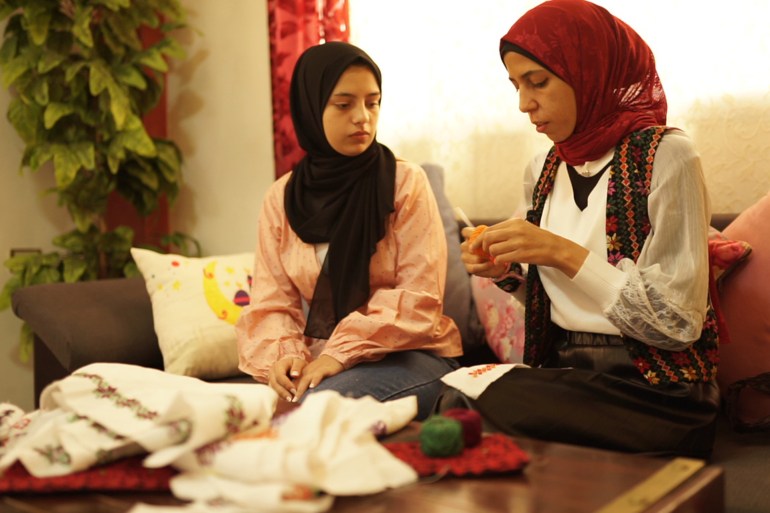Near the largest Palestinian refugee camp - Al-Baqa'a camp - Zahra Abu Taha lives and lives in homesickness. There, in Ein Al-Basha, we met her, carrying flowers embroidered on her Palestinian clothes, as she wafts the fragrance of hope for a close return to Palestine.
Zahra Abu Taha learned embroidery from an early age (Al-Jazeera)
Abu Taha lived her childhood in the heart of the largest camp, which is called the Palestinian capital of the Diaspora, and then went out with her family to an area near the camp like the rest of his family, as they cannot move away from this geography associated with the memory of the Nakba, the setback, and the right of return.
Abu Taha was introduced to the embroidery craft since her childhood through her grandmother who used to send embroidered dresses from inside the occupied territories to Jordan.
Then Abu Taha's mother wears it to Palestinian events, in a look engraved with her memory, she says.
Abu Taha (right) teaches her friends to embroider to pass on the craft for generations and preserve it from Judaization (Al-Jazeera)
Abu Taha continues that the symbolism of these garments and the interest of the camp residents and the Palestinians in gaining possession of them.
He pushed her to ask about these garments and the differences that distinguish them, and how each Palestinian city is unique with its own type of embroidery, through which she can distinguish Palestinian women from any city or village, which is what made her learn this craft from a very early age.
Abu Taha, who studied architecture, did not find it difficult to develop her talent for embroidery and to combine it with modern and modern clothes, "in order to preserve the survival of the styles by keeping pace with the modern generations," as she put it.
Abu Taha feels homesick when she is entangled with a needle and thread (Al-Jazeera)
Occupation theft of heritage
Abu Taha says - to Al-Jazeera Net - that the occupation is stealing everything related to the identity of the Palestinian person and attributing it to him, such as food, drink, music, etc., and the heritage of embroidery has not been spared from this theft, which the occupation promotes globally as "it is part of its culture." Taha stressed the need to inherit this craft for generations to keep it from Judaizing.
Abu Taha works to teach her friends the craft of embroidery, adding that it is not necessarily for earning a livelihood, as it represents the identity of the Palestinian, wondering how can it be forfeited to a historical legacy that began with the Canaanites, and was distinguished by the peculiarity of each Palestinian city and village ?!
Abu Taha feels homesick when she is entangled with a needle and thread (Al-Jazeera)
Embroidery and the Nakba
Abu Taha added that she feels a nostalgia reminding her of returning home when she intertwines with needle and thread to draw a heritage painting expressing on the cloth, and continues that the embroidered dresses used to distinguish the Palestinian woman, so it is known from which Palestinian city or village came to the market.
She continues that the embroidery acquired great symbolism after the Nakba, as the green color indicates the green lands that were bloodied with the blood of the martyrs, and the red color indicates the blood of the Palestinian martyrs.
Abu Taha concluded that Eid al-Fitr coincided with the anniversary of the Nakba. She had a mixed feeling between joy and sadness, especially since the Palestinians in Jerusalem and in the Sheikh Jarrah neighborhood are threatened with a disaster "similar to the one we experienced," hoping that the next Eid would come and Palestine was liberated and was able to wear embroidered dresses on its original land. .
Different embroideries from each other before they are combined with the clothes (Al Jazeera)
Jill loves to embroider
Tamam Al-Yasouri in the sixties, confirmed to Al-Jazeera Net that girls' interest in learning the craft of embroidery is increasing, and that generations are inheriting this craft from different ages.
Al-Yasouri is a trainer at a craft center in the Baqaa camp, and she has trained 500 Palestinian girls in mastering the craft of embroidery.
Palestinian embroidery is distinguished by its dome in the form of number 7 since ancient times (Al-Jazeera)
Al-Yasouri added that technology and the spread of social media have contributed to the arrival of the culture of embroidery for modern generations. She says that most of those who come to learn in the prime of life are for patriotic and moral motives, and she continues "most of the girls are educated" to emphasize the motives for learning this craft, and to protect it from theft and Judaization.

